Story Highlights
- Amid Zimbabwe's double-digit gains, double-digit losses in Ghana
- S. Africa had the highest 2014 index score, Tanzania the lowest
This article is part of a series on well-being and development trends in sub-Saharan Africa, focusing on 12 nations that Gallup has surveyed every year since 2008.
WASHINGTON, D.C. -- Gallup's Community Basics Index, which evaluates everyday life in a community, including people's satisfaction with the environment, housing and infrastructure, was highest in 2014 in South Africa (64) and lowest in Tanzania (38).
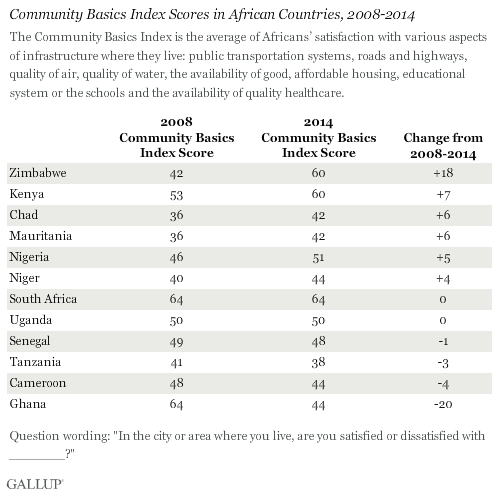
Over the past seven years, the index has increased the most in Zimbabwe (+18 points) and fallen the most in Ghana (-20 points). These changes bear watching, given that infrastructure is a key pillar in the new Sustainable Development Goals adopted by the United Nations last weekend. The financing and maintenance of infrastructure projects, as well as taking into account the voices of users, will be critical to the success of these new goals.
The index is a mean score of residents' satisfaction with key aspects of infrastructure in their communities, such as roads, schools, healthcare and water quality. It has a strong relationship with outside measures, such as GDP per capita and child mortality, among others. Further, research has shown that infrastructure is related to economic growth and human development. As such, the Community Basics Index is a snapshot of how residents perceive their infrastructure and is particularly useful when trended over time.
Since 2008, South Africa has usually had the highest Community Basics Index score, while Tanzania's score has usually been at or near the bottom; each country's score has also varied little in the time since the first survey administration.
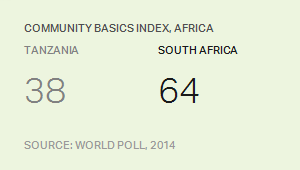
Scores in Ghana, which tied with South Africa's relatively high score of 64 in 2008, have gradually declined ever since, with a current index score of 44 in 2014. Zimbabwe, on the other hand, began with a fairly low score of 42 in 2008 and saw increases nearly every year to its current index level of 60.
Nigeria's Index Score Holds While Its Neighbors' Scores Falter
Between 2008 and 2011, Nigeria had lower index scores than neighboring Cameroon and Ghana. But the gap separating Nigeria and its neighbors has narrowed in the past five years. And since 2013, Nigeria's index score has been the highest in Western Africa, as scores in both Cameroon and Ghana fell from 52 in 2012 to 44 in 2014.
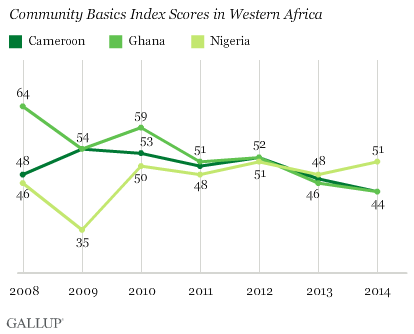
Sahel Region's Four Nations Score Within Seven-Point Range in '14
The latest 2014 index ratings are the most tightly clustered that each of the Sahel countries of Senegal (48), Niger (44), Chad (42) and Mauritania (42) have scored over the years -- within a seven-point range. The Sahel countries have typically had more varied index scores, such as in 2009 when Niger's score was 53, a high for any country in the region. That same year, Chad had a score of 31, the lowest score any country in this region has had since 2008.
Both Chad and Mauritania saw the greatest improvements in the region since 2008, with each increasing from a 36 index score in 2008 to 42 in 2014. Still, both countries have the lowest scores in the Sahel region.
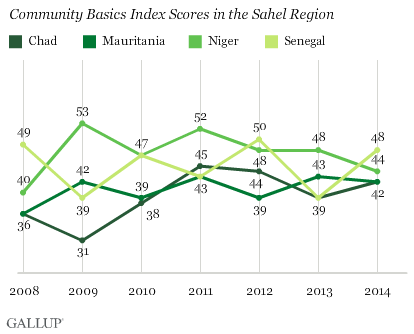
Kenya Maintains Highest Score Among Eastern African Countries
Kenya's latest index score in 2014 is not only a new high for the country, but also for the Eastern African region as a whole. Kenya has consistently had the highest index score in the region since 2008, while Tanzania has had the lowest each year. Although Tanzania's latest score of 38 is lower than initial scores, it's higher than the country's previous low of 35 in 2010 and 2012. Uganda's index score, meanwhile, has been remarkably stable -- never straying far from its 49 to 53 range.
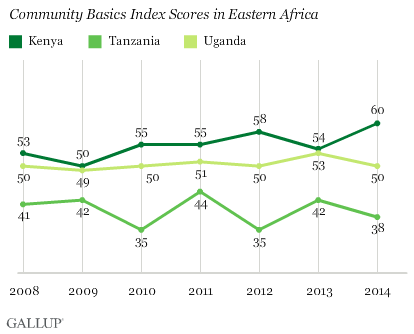
A Narrowing Gap Between South Africa and Zimbabwe
South Africa and Zimbabwe once had drastically different index scores, with 22 points separating them in 2008. But the gap between the two southern neighbors has been narrowing and their index scores have been within five points of one another since 2010. Although South Africa has nearly always had a higher score, Zimbabwe had a similar score in 2012.
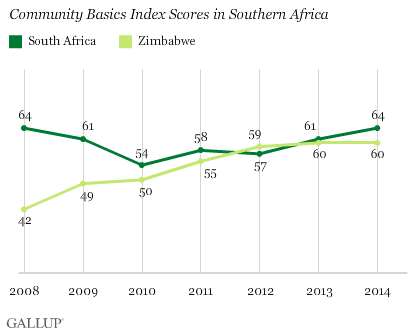
Implications
Findings from the Community Basics Index paint a middling picture. Save for Zimbabweans' remarkable lift, in most other countries, residents' satisfaction with key aspects of their communities' infrastructure has remained relatively low since 2008. Even countries whose base score was at least 50, such as South Africa and Uganda, have not seen any improvement. Ghana, whose base score was similar to South Africa's, is now more on par with scores from the Sahel countries.
Infrastructure in most African countries lags behind that of other developing countries worldwide. In addition, large infrastructure projects are capital intensive and require time and large investments. As a result, it is perhaps not surprising to see that over a seven-year time frame, residents' increase in satisfaction with their infrastructure is tepid at best.
Diana Liu contributed analysis to this report.
The data for the items that make up the Community Basics Index are available in Gallup Analytics.
Survey Methods
Results are based on face-to-face interviews with at least 1,000 adults, aged 15 and older, conducted every year between 2008 and 2014 in Cameroon, Chad, Ghana, Kenya, Mauritania, Niger, Nigeria, Senegal, South Africa, Tanzania, Uganda and Zimbabwe. For results based on the total sample of national adults, the margin of sampling error is ±3.8 percentage points at the 95% confidence level. All reported margins of sampling error include computed design effects for weighting.
Learn more about how the Gallup World Poll works.
For complete data sets or custom research from the more than 150 countries Gallup continually surveys, please contact us.
